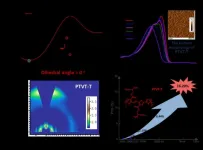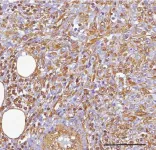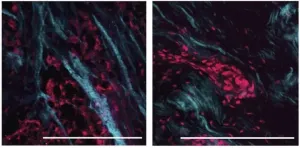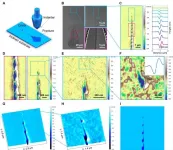(Press-News.org) Long-term, regular use of baby aspirin--at least 15 times per month--prior to a diagnosis of colorectal cancer (CRC) may reduce the risk of death from the disease by limiting the spread of cancerous tumors pre-diagnosis, according to a study led by Cedars-Sinai Cancer researchers.
While previous research has offered consistent evidence that low-dose aspirin use reduces colorectal cancer risk, key findings from the study, published in the peer-reviewed Journal of the National Cancer Institute, revealed that the use of baby aspirin prior to the diagnosis of non-metastatic CRC was associated with a lower rate of metastasis, or tumor spread. Starting aspirin after a colorectal cancer diagnosis was not associated with as strong a benefit as pre-diagnosis use. The researchers similarly found that the use of non-aspirin, nonsteroidal anti-inflammatory drugs (NSAIDs), such as ibuprofen, acetaminophen and naproxen, failed to confer those benefits.
"More evidence is needed, but this association between baby aspirin and lower death rates is highly significant," said epidemiologist and lead study author Jane C. Figueiredo, PhD. "These findings may provide an inexpensive lifestyle option to people seeking to prevent colorectal cancer, or to improve their prognoses if they are diagnosed."
Colorectal cancer starts in the colon or the rectum and is the third-leading cause of cancer death for men and women in the U.S., causing approximately 53,000 deaths last year. The American Cancer Society estimates that about 104,600 cases of colon cancer and 43,300 cases of rectal cancer were diagnosed in the U.S. in 2020. Treatment usually involves surgery to remove the cancer, and possibly radiation therapy and chemotherapy.
How Aspirin Works
Researchers believe that differences in the way the aspirin and non-aspirin NSAIDs work affect the medications' differing colorectal cancer survival outcomes.
Low-dose aspirin use irreversibly prevents blood cells called platelets from activating and producing the enzyme thromboxane A2, which allows them to clump together. Tumor cells can attach to these clumps of platelets and spread throughout the body.
"Aspirin inhibits platelet activation, which also could inhibit metastases," said Figueiredo, the director of Community and Population Health Research and an associate professor of Medicine at the Samuel Oschin Cancer Institute at Cedars-Sinai.
Aspirin blocks platelet activation for the life cycle of the platelet. While non-aspirin NSAIDs also inhibit platelet activation, they do not do so permanently, and this could be why a strong association between their use and reduced rates of metastatic disease was not found.
Randomized clinical trials have provided some evidence that non-aspirin NSAIDs may inhibit colorectal cancer tumor formation. However, their association with colorectal cancer-specific mortality has been investigated in only a handful of studies, and the findings have been conflicting.
"Previous studies have not really separated aspirin use from use of non-aspirin NSAIDS," said Figueiredo. "We sought to understand the relationship between aspirin and non-aspirin NSAIDS and mortality in colorectal cancer patients."
Study Details
The observational study conducted by Figueiredo and colleagues included data from more than 2,500 men and women enrolled in the American Cancer Society Cancer Prevention Study-II nutrition cohort. All shared information about their aspirin and non-aspirin NSAID use and all eventually were diagnosed with colorectal cancer. Researchers tracked participants' outcomes from their time of enrollment in 1992 or 1993 through December 2016. While the study did show that participants who began regular aspirin use after their diagnosis had better outcomes than those who did not use aspirin at all, the benefit was not clear enough to be called significant.
Figueiredo said that ongoing clinical trials are examining the impact of aspirin use, before and after diagnosis, on colorectal cancer mortality. When completed, they will provide additional guidance for physicians recommending treatments for their patients. "We have to wait until those results come out," Figueiredo said.
"There are potential harms associated with aspirin use," said Figueiredo. Daily use may increase the risk of allergic reaction and internal bleeding. "There really needs to be a conversation between clinicians and patients about both the risks and benefits. These studies and our results really add to that conversation."
INFORMATION:
Funding: American Cancer Society funds the creation, maintenance and updating of the Cancer Prevention Study-II cohort. The society did not oversee the study and has not participated in the collection, analysis or interpretation of the data, the preparation of the manuscript or the decision to submit the manuscript for publication.
Read more on the Cedars-Sinai Blog: Colorectal Cancer Surgeon Zuri Murrell
LOS ANGELES (April 1, 2021) -- A single dose of the Pfizer-BioNTech vaccine for individuals who previously had COVID-19 generates an immunologic response similar to that of individuals receiving the two-dose recommended sequence, according to a Cedars-Sinai study published today by the journal Nature Medicine.
"Our findings extend those from smaller studies reported elsewhere and support a potential strategy of providing a single dose of vaccine to persons with a confirmed prior history of coronavirus infection, along with two doses for people not previously infected," said Susan Cheng, MD, MPH, MMSc, associate professor of Cardiology and director of Public Health Research at ...
Organic solar cell (OSC) is one of the most important green energy technologies. The photovoltaic efficiencies of OSCs are closely related to the photoactive layers, which are prepared by blending electron donor and acceptor materials. With the emergence of a large number of new organic photovoltaic materials and effective molecular modification methods, the photovoltaic efficiency of OSCs has been greatly improved. Accordingly, the molecular structure of the materials is becoming much more complex with high costs, which is difficult to meet the requirements of the industrialization of OSCs. Thus, it is of great importance to develop novel photovoltaic ...
Scientists in Japan have developed and tested a novel probiotic formulation to control severe diarrhea in calves, ensuring their health and reducing mortality, and in turn reducing economic loss.
The health of calves is a crucial component in animal husbandry; diseases that affect calves cause economic losses to livestock farms either directly, due to death of the calves, or indirectly, due to weight loss that reduces productivity over the animals' lifespans. In Japan, bovine rotavirus (BRV) and bovine cryptosporidiosis infections are major diseases that cause severe diarrhea in calves.
A team of scientists from Hokkaido, including Associate Professor Satoru Konnai of the Faculty of Veterinary Medicine at Hokkaido University, have ...
Researchers in Italy have identified a pair of microRNA molecules that help maintain a population of cancerous stem cells that drive the growth of breast cancers and initiate tumor relapse after treatment. The study, which will be published April 2 in the Journal of Cell Biology (JCB), reveals that targeting these microRNAs makes cancer stem cells more susceptible to some chemotherapies and could potentially improve the prognosis of patients with aggressive forms of breast cancer.
Many tumors contain a small population of cancer stem cells that initiate tumor growth and give rise to the various cell types found in tumors. Moreover, because cancer stem cells are often resistant to radio- and chemotherapies, they can survive and promote tumor ...
Researchers at the University of California, San Francisco, have discovered that aggressive, triple-negative breast cancers (TNBCs) can evade treatment by reorganizing and softening the collagen matrix that surrounds the cancer cells. The study, which will be published April 2 in the Journal of Experimental Medicine (JEM), shows that the softer matrix activates a signaling pathway that promotes the cancer cells' survival, and suggests that targeting this pathway could enhance the effectiveness of chemo- and radiotherapy in TNBC patients.
TNBC is an aggressive type of breast cancer with worse survival rates than other forms of the disease. Because TNBC cells lack the HER2 signaling ...
A team of researchers has identified several candidates for drugs against the coronavirus SARS-CoV-2 at DESY´s high-brilliance X-ray lightsource PETRA III. They bind to an important protein of the virus and could thus be the basis for a drug against Covid-19. In a so-called X-ray screening, the researchers, under the leadership of DESY, tested almost 6000 known active substances that already exist for the treatment of other diseases in a short amount of time. After measuring about 7000 samples, the team was able to identify a total of 37 substances that bind to the main protease (Mpro) of the SARS-CoV-2 virus, as the scientists report online today in the journal ...
Glassy materials play an integral role in the modern world, but inherent brittleness has long been the Achilles' heel that severely limits their usefulness. Due to the disordered amorphous structure of glassy materials, many mysteries remain. These include the fracture mechanisms of traditional glasses, such as silicate glasses, as well as the origin of the intriguing patterned fracture morphologies of metallic glasses.
Cavitation has been widely assumed to be the underlying mechanism governing the fracture of metallic glasses, as well as other glassy systems. Up until now, however, scientists ...
A new study indicates holes the solution to operational speed/coherence trade-off, potential scaling up of qubits to a mini-quantum computer.
Quantum computers are predicted to be much more powerful and functional than today's 'classical' computers.
One way to make a quantum bit is to use the 'spin' of an electron, which can point either up or down. To make quantum computers as fast and power-efficient as possible we would like to operate them using only electric fields, which are applied using ordinary electrodes.
Although spin does not ordinarily 'talk' to electric fields, in some materials spins can interact with electric fields indirectly, and these are some of the hottest materials currently studied ...
In May 2020, a team led by thoracic surgeon Konrad Hoetzenecker of the Department of Surgery of MedUni Vienna and Vienna General Hospital performed a lung transplant on a 44-year-old patient who had been seriously ill with Covid-19, making her the first patient in Europe to receive a lung transplant for this indication. The Vienna lung transplantation programme now plays a leading role in an international consortium comprising experts from the USA, Europe and Asia. Based on the expertise from Vienna, approximately 40 transplants have now been carried out on Covid-19 patients throughout the world. In a study published in the leading journal ...
Russian researchers have developed an inexpensive, safe, and reliable packed eggs surface disinfection technology. This technology helps to kill bacteria, including salmonella, on eggshells. Also, it allows growing broiler chickens with strong immunity to viral diseases. Packed eggs are disinfected with 50 nanoseconds (one billionth of a second) electron beam. Disinfection takes place in plastic containers. The description of the technology was published in Food and Bioproducts Processing.
"Disinfection of the packed eggs protects eggs from subsequent contamination during storage", said Sergey Sokovnin, a professor at Ural Federal University and Ural Branch of Russian Academy of Science. "We found out that 5 kGy is enough for disinfection. Such dose allows to ...








